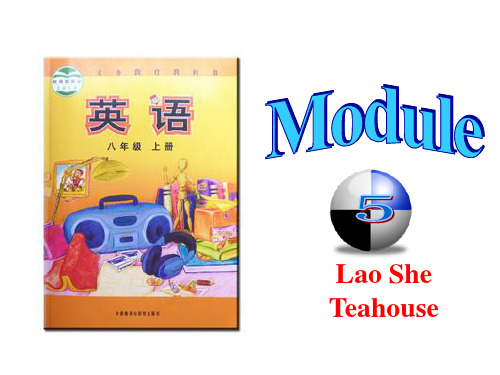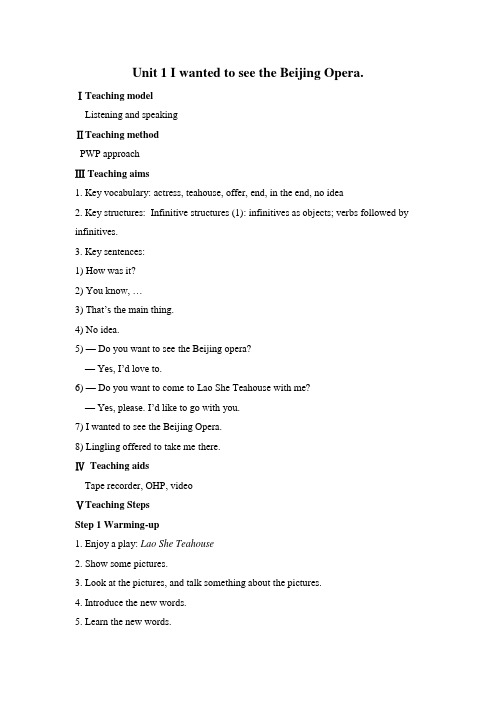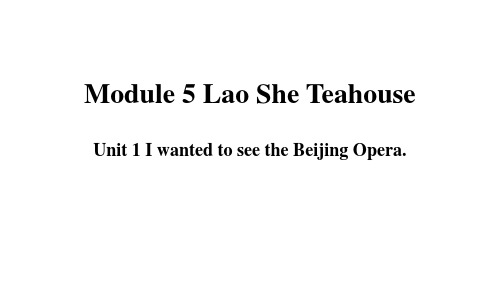Unit 1 I wanted to see the Beijing Opera 习题
八上M5U1I wanted to see the Beijing Opera

八年级上Module 5 Lao She TeahouseUnit 1 I wanted to see the Beijing Opera .导学案学习目标:1.正确使用以下单词、短语:actress, teahouse, offer, end,offer to,in the end,plan to do,hope to do2.能够听懂含有动词不定式的对话,感知和运用动词不定式作宾语的用法3. 体会我国传统文化的博大精深,激发我们对伟大的剧作家的兴趣,增强文化底蕴.课前预习1.预习Module 5 单词,做到会读,会写。
2.了解中国京剧文化及老舍茶馆。
课上探究Step 1.Warm up1.Enjoy something about Beijing Opera.学唱京剧:蓝脸的窦尔敦盗御马/红脸的关公战长沙黄脸的典韦/白脸的曹操/黑脸的张飞叫喳喳……2.Talk about Lao She and Teahouse.Step 2.Listening and reading1.Listen and underline the correct words or expressions in Activity2.2.Listen to the passage and underline the sentences with ―to do‖3.Make sentences with ―to do‖4.Read and check the true sentences.(Activity3)5.Read the passage after the reading-pen and find out the difficulties.6.Read again and underline the important phrases and sentences.Then discuss in groups.Step nguage points.1. ... so Lingling offered to take me there.……因此,玲玲提出带我去(那)。
Unit 1 I wanted to see the Beijing Opera 课件13

Now check sentences.
(√ )
the
true
√ √ √
1 Tony went to Lao She Teahouse with Betty and Lingling. 2 Betty understood the opera. 3 Lingling and Betty stayed longer than they planned. 4 Betty enjoyed the opera. 5 Betty would like to go to the Beijing Opera again.
老舍茶馆是以老舍先生命名的茶馆,建于 1988年,古香古色、京味十足。可以欣赏 到曲艺、戏剧名流的精彩表演,同时品用 名茶、宫廷细点和应季北京风味小吃。开 业以来,老舍茶馆接待了很多中外名人, 享有很高的声誉。
actress / / teahouse offer end in the end no idea
Lao She Teahouse
Unit 1 I wanted to see the Beijing Opera .
京剧五大行当(角色)
生:诸葛亮、关羽、宋江、 旦:杨贵妃、秦香莲、穆桂英、 净:包公、黄盖、荆轲、 丑:蒋干、时迁、 末: 生中的一个分支,现基本划归为生。
老舍,(1899.02.03日—1966.08.24日), 原名舒庆春, 字舍予。北京满族正红旗人。中国现代小说家、著名 作家,杰出的语言大师、人民艺术家,新中国第一位 获得“人民艺术家”称号的作家。代表作有《骆驼祥子》 《四世同堂》、剧本《茶馆》。1966年,由于受到文 化大革命运动中恶毒的攻击和迫害,老舍被逼无奈之下 含冤自沉于北京太平湖。
Listen and choose the best answer to the following questions. 1.Who did Lingling go to Lao She Teahouse with last night? A.Betty B.Lingling C.Tony 2.What did they do at Lao She Teahouse? A.Drink tea B.See the Beijing Opera C.Both A and B 3.How long did they stay there? A. 1 hours B. 2 hours C. 3 hours
Module5Unit1IwantedtoseetheBeijingOpera教案

5.文化了解:通过学习北京京剧,了解中国传统文化,培养跨文化交际意识。
课程设计将围绕以上内容,结合学生的实际情况,以提高学生的英语听说读写能力和跨文化交际能力为目标。
二、核心素养目标
《Module 5 Unit 1 I wanted to see the Beijing Opera教案》
4.学习能力:激发学生的学习兴趣,引导学生自主探究和合作学习,培养其独立解决问题的能力,提高学习效率。
三、教学难点与重点
《Module 5 Unit 1 I wanted to see the Beijing Opera教案》
1.教学重点
(1)新词汇的掌握:课程中的新词汇如Beijing Opera, mask, character等是本节课的核心内容,教师需引导学生正确发音、理解词义,并能够熟练运用;
在实践活动方面,我发现学生们在角色扮演活动中表现出了很高的热情,但也存在一些表演上的不足。针对这一点,我打算在接下来的课程中,加强对学生表演技巧的指导,如发声、表情和动作等,以提高他们的表演水平。
此外,课后我收到了一些学生的反馈,他们表示在课堂上学到的京剧知识让他们对传统文化有了更深的认识。这让我意识到,在教学中融入文化教育的重要性。因此,我将在今后的教学中有意识地加入更多关于中国传统文化的内容,培养学生的民族自豪感。
举例:学生能够正确运用词汇描述京剧中的角色和面具。
(2)重点句型的运用:掌握重点句型如I wanted to see...,I expected...,I thought...等,并能结合实际情境进行对话练习;
举例:学生能够运用重点句型表达自己对京剧的期待和观后感。
Unit 1 I wanted to see the Beijing Opera教案06

Unit 1 I wanted to see the Beijing Opera.ⅠTeaching modelListening and speakingⅡTeaching methodPWP approachⅢ Teaching aims1. Key vocabulary: actress, teahouse, offer, end, in the end, no idea2. Key structures:Infinitive structures (1): infinitives as objects; verbs followed by infinitives.3. Key sentences:1) How was it?2) You know, …3) That’s the main thing.4) No idea.5) — Do you want to see the Beijing opera?—Yes, I’d love to.6) — Do you want to come to Lao She Teahouse with me?— Y es, please. I’d like to go with you.7) I wanted to see the Beijing Opera.8) Lingling offered to take me there.ⅣTeaching aidsTape recorder, OHP, videoⅤTeaching StepsStep 1 Warming-up1. Enjoy a play: Lao She Teahouse2. Show some pictures.3. Look at the pictures, and talk something about the pictures.4. Introduce the new words.5. Learn the new words.6. Read the new words.Step 2 Work in pairs.1. Ask the students to read the words in the box in Activity 1.actress dance music play sing teahouse theatre traditional2. Look at the pictures in Activity 1, and talk about them.3. Work in pairs. Use the words from the box to help you.Step 3 Listening practice.1. Ask the students to read through the sentences in Activity2.1) Betty often sees / wants to see some traditional Beijing opera.2) Betty knows / doesn’t know Lao She Teahouse.3) Lingling says that the opera is easy / difficult to understand.2. Play the recording once without stopping.3. Listen and underline the correct words.4. Play the recording again and ask the whole class to check with a partner.5. Check the answers:Keys: 1. wants 2. doesn’t know 3. difficultStep 4 Listen and read.1. Show some pictures, and ask the students to talk about them.2. Ask the students to read the conversation silently.3. Play the recording and ask the students to listen and read the conversation.4. Read the conversation.5. Act it out.6. Learn “Everyday English”1) How was it?2) You know, …3) That’s the main thing.4) No idea.Step 5 Check the true sentences.1. Ask the students to read the conversation again.2. Now check the true sentences.1) Tony went to Lao She Teahouse with Betty and Lingling.2) Betty understood the opera.3) Lingling and Betty stayed longer than they planned.4) Betty enjoyed the opera.5) Betty would like to go to the opera again.6) Betty knew about Lao She before she went to the teahouse.3. Ask the students to check with a partner.4. Check the answers:Keys: 1. ×2. ×3. √4. √5. √6.×Step 6 Complete the passage.1. Ask the students to read the words in the box in Activity 4.actress difficult end main offer2. Read through the passage.Betty wanted to see the Beijing opera, so Lingling (1) ________ to take Betty to Lao She Teahouse. The words of the opera were (2) ________ to understand, but the actors and (3)__________ were excellent. They only planned to watch for an hour, but in the (4) ________, they stayed for three hours. Betty thought it was interesting — that was the (5) ________ thing!3. Complete the passage with the correct form of the words from the box.4. Ask the students to check with a partner.5. Check the answers:Keys: 1. offered 2. difficult 3. actresses 4. end 5. mainStep 7 Listen and repeat.1. Play the recording once without stopping.2. Play the recording again and ask the whole class to repeat.1) — Do you want to see the Beijing opera?—Yes, I’d love to.2) — Do you want to come to Lao She Teahouse with me?—Yes, please. I’d like to go with you.3. Ask the students to listen and mark the intonation.4. Now listen again and repeat.Step 8 Homework。
八上M5U1IwantedtoseetheBeijingOpera习题外研版

D. watched
一二三四五六七
( B )17. 易错题Lu Xun was famous
his
novels
a great writer.
A. for; for
B. for; as
C. as; as
D. as; for
点拨:be famous for...意为“因为……而出名”;be famous
一二三四五六七
AA:. IYweasn,t tobusteCe aToeaYhuouissem. y favorite writer.29. E
BB:. TDhiedsyhoouwwwaatcshgarenayt.of his plays? AC:. IYt’sesa. nLoavset ly. ear I watched Sunrise(《日出》)in Beijing. D. Then which work do you like best?
as...意为“作为……而出名”。
一二三四五六七
( B )18. [2024·连云港月考]It’s hard for us to say
goodbye
we have so many happy days to
remember.
A. and
B. because
C. but
D. so
一二三四五六七
( D )19. —
novels. The people in the story usually 38 disagreement(意见
不一).
( D )37. A. you
B. it
C. us
D. them
( A )38. A. have
B. see
Module5Unit1IwantedtoseetheBeijingOpera.知识点课件英语八年级

(1)作动词,意为"结束;终止"。①end with+具体名词(a song/dance等) 以……结束(强调方式)②end in+抽象名词(failure/divorce等) 以……结束(强调结果)
(2)作名词,意为"(时间、事件等的)结局;末端,尽头"。①the end of ……的末尾②at the end of 在……尽头/结束时(可表示地点或时间)③by the end of 到……末为止(常表示时间)
语境串记He asked the kids to find several keys in the house at the end of the road by the end of 11:00. In the end, only one kid finished the task.他要求孩子们在11点之前找到放在路尽头的那所房子里的几把钥匙。最后,只有一个孩子完成了任务。
A
【解析】句意:——在过去的五年内,中国在"一带一路"中扮演着重要角色。——它给很多国家提供了一个交流的好机会。offer"提供",support&#;导演"。由语境可知选A。
教材语境 But the actors and actresses were excellent. 但是男女演员都很出色。(教材P34)
教材语境 You know,I wanted to see the Beijing Opera,so Lingling offered to take me there. 你知道的,我想看京剧,所以玲玲提出带我去那里。(教材P34)
you know 你知道的
常用于口语,用来对某事进行解释,表达自己的看法或提供更多的信息。
《I wanted to see the Beijing Opera》PPT课件
A. lent
B. took
С. offered
D. brought
2. Chorlin wants _______ a job as an English teacher in China.
A. finding
B. to find С. finds D. find
3._____ is not easy for everyone to learn English well.
【要点】actress名词,意为“女演员”。其对应词为actor“男演员”。 【例】She is my favourite actress.
她是我最喜欢的女演员。
5 5
3 We only planned to watch for an hour, but in the end, we stayed for three hours. 我们本来计划只看一个小时,但最后我们待了三个小时。
They offcred me a very good job. = They offered a very good job to me. 他们给我提供了一份很好的工作。
5
1 You know,wanted to see the Beijing Opera, so Lingling offered to take me there. 你 知道,我想看京剧,因此玲玲提议带我去那里。
5 5
Part 2
单词句子知识详解
Pellentesque Habitant
5 5
the Beijing Opera
5
actor
actress
teahouse Lao She Teahouse
Pellentesque Habitant
M5 Unit1-I wanted to see the Beijing Opera
Quiz
注: word 文档 点击此处链接
一、用所给单词的适当形式填空。 1. She asked me ______ (wait) for her to wait at the cinema. 2. I enjoy ________ (listen) to the radio listening in the evening. 3. It is not easy _______ (learn) a foreign to learn language. 4. He agreed _____ (get) someone to help to get us.
三、根据汉语提示完成下列句子,每空一词。
1. 我想在那个美丽的城市呆更久。 I would like to stay longer in that beautiful ____ _____ city. 2. —你知道那位穿红衣服的女孩的名字吗? —不知道。 —Do you know the name of the girl in red? — __ ____. No idea
7 Complete the sentences. go to watch a movie 1. I want to __________________ at the cinema ____________ next week. have a picnic 2. They offered to ____________. be a singer one day 3. I hope to __________________. 4. My parents agree to go for a walk _____________ on Saturday.
3. 法国以其葡萄酒而闻名。 is ______ for France ___ famous ____ its wine. 4. 你如果努力工作,你最终会达到目 的的。 You will get there ___ ____ ____ if you in the end work hard! 5. 安静些,我们可不想让人人都知道 这件事。 Keep quiet, we don’t want everyone to know _____ _____ about it.
Unit1 I wanted to see the Beijing opera教学设计06
课题摘要
学科
英语
学段
初中
年级பைடு நூலகம்
八年级
单元
第一单元
教材版本
外研版
课程名称
Unit1 I wanted to see theBeijingopera .
一、学习内容分析
1.教材分析
学习动词不定式,形容词比较级和最高级
2.学情分析
让学生们利用动词不定式短语并且更深的了解老舍
3.教学目标(含重难点)
1.评价方式与工具
□课堂提问□书面练习□制作作品□测验□其它
2.评价量表内容(测试题、作业描述、评价表等)
1,动词不定时专题练习
2,完成配套课时精炼
3,背诵重点词组
六、备注
技术环境下课堂教学管理思路、可能存在的教学意外及相应的应急预案等
备注:本模板仅供参考,参训教师可根据实际情况,自行修改创新。
1,学习动词不定式
2,了解中国的传统喜剧
3,了解老舍的茶馆
二、教学环境选择
□简易多媒体教室□交互式电子白板□网络教室□移动学习环境
三、教学过程设计
教学环节
活动设计
信息技术使用说明
引入
复习已经学过的不定式
能增加题量
听读
播放录音听读课文
更直观
操练
让学生利用问答的形式,操练动词不定式
更形象,生动
四、教学评价设计
Unit 1 I wanted to see the Beijing Opera教案13
新外研英语八年级上Module 5 Unit 1教案Unit 1 I wanted to see the Beijing Opera.课型:Listening and speaking课时:45 minutes课前预测In this Unit, they’ll learn some verbs that are followed by an infinitive,it’s not too difficult.教学方法:Interactive approach, Listening and speaking.板书设计:Key words and sentences in PPT.教学目标:1. Master the key words and expressions in Unit 1.2.Learn about the use of verbs that are followed by an infinitive .3.Cultivate their ability of creation.教学重难点:1.Key words and expressions:actor, actress, teahouse, offer, in the end, etc.2.Key sentences:I want to see the Beijing Opera.How was it?That’s the main thing.I hope to understand more next time.Etc.3.Learn about the use of verbs that are followed by an infinitive教学准备:PPT/pictures on the Internet/ videotape.教学过程:Step 1.Warming up:Free talk about Lao She and his teahouse.step2.Introduction1.Learn all the new words in Unit 1, read them together,especially, pay attention totheir pronunciation.2.Without showing the English spelling or Chinese meaning,have a quick test.Step3.Work in pairsUse the words in the box to help you to finish Part 1, Talk about the pictures freely.Step4.Listening1.Listen to the tape in Part 2 and underlined the correct words or expressions to complete Part 22.Listen to the tape in Part 3 and find the answers to the questions designed before class.3.Check answers, encouragement should be given.Step 5. Check the true sentencesCheck the true sentences in Parts 3. Check answers one by one.Step6.Read.1.Read the dialogue carefully in Part 3, find the keys and solve them.2.Read Part 3 together, then in groups, finally in pairs. Give them more encouragement.3.Everyday English and key phrases.Step7.VideoEnjoy the video in Part 3.Step 8. Complete the passageComplete the passage in Part 4 and read it together in class.Stetp 9. Pronunciation and speaking1.Read and predict which words in the answers the speaker is likely to stress.,Listen and checkto finish Part 5.2.Work in pairs to read the conversation to finish Part 6.plete the sentences in Part 7 freely, check answers freely after preparing for some time.4.Work in pairs to talk about something you’d like to see or do to finish Part 8.Step 10. Grammar.Sum up the use of some verbs that are followed by an infinitiveStep 11.ExercisesDo some exercises in class to consolidate what they have learnt in this lesson. Encouragement should be given.Step 12. Homework1.Make sentences with verbs that are followed by an infinitive and write them in yourexercise books.2.Additional exercises.。
- 1、下载文档前请自行甄别文档内容的完整性,平台不提供额外的编辑、内容补充、找答案等附加服务。
- 2、"仅部分预览"的文档,不可在线预览部分如存在完整性等问题,可反馈申请退款(可完整预览的文档不适用该条件!)。
- 3、如文档侵犯您的权益,请联系客服反馈,我们会尽快为您处理(人工客服工作时间:9:00-18:30)。
Module 5 Unit 1 习题
Ⅰ.根据句意及汉语提示完成单词
1.We________(主动提出)to help clean the house yesterday.
2.The________(传统的)breakfast in this area includes bread and eggs.
3.Gong Li is a famous________(演员). We all like her.
4.We________(计划)to visit London last summer holiday.
5.Mo Yan is a famous________(作家).
Ⅱ.从方框中选择恰当的词并用其适当形式填空
teahouse, main, end, understand, especial
1. The________ idea of the passage is about the Internet.
2. My father likes drinking tea with his friends in the________ at the weekend.
3. T he class________ up with a song.
4. It was difficult to________ what he said.
5. The road is hard to walk on,________ at night.
Ⅲ.单项选择
1.—Would you like to see Teahouse?
—______.
A. Yes, I’d like to
B. No, I am not
C. Yes, please
D. No, thanks
2.—May I borrow your mobile phone? I want______ my father.
—Of course.
A. call
B. calling
C. to call
D. to calling
3.—Who’s the man under the tree?
—______.
A. Thank you
B. You’re right
C. You’re welcome.
D. Sorry, I don’t know
4. I hope______ you and your family soon.
A. seeing
B. to see
C. will see
D. see
5.—What is Lao She famous______?
—Teahouse and Camel Xiangzi.
A. for
B. as
C. on
D. about Ⅳ.完成句子
1.我想在那个美丽的城市待更久。
I would like to________ ________in that beautiful city.
2.我父母同意带我去北京参观颐和园。
My parents________ ________take me to Beijing to visit the Summer Palace. 3.——你知道那部电影的名字吗?
——不知道。
—Do you know the name of that film?
—________ ________.
4.这个女孩主动帮助那位老人搬箱子。
The girl________ ________carry the box for the old man.
5.最后他们放弃了那个计划。
They gave up that plan________ ________ ________.
感谢您的阅读,祝您生活愉快。
